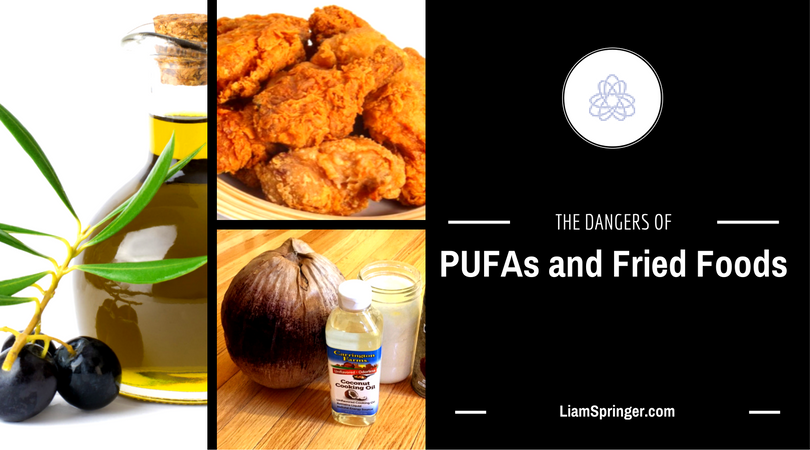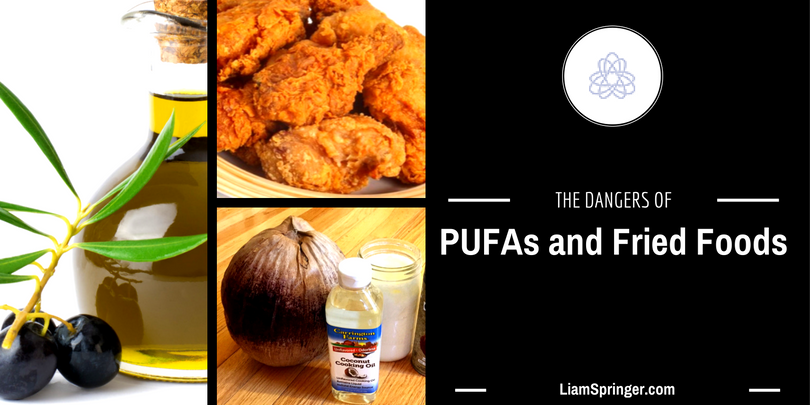
The problem with eating fried foods and fast foods is not simply that they are high in fat. It’s that they are high in a certain type of fat: PUFAs. In my recent posts on The Truth about Clogged Arteries and The Many Causes of Heart Disease, I’ve encouraged readers to eat a diet that is low in PUFAs. But what are PUFAs exactly? Why are they so bad for heart health? And what specific foods should you cut out from your diet?
What Are PUFAs?
PUFAs are polyunsaturated fatty acids. They are a type of unsaturated fat commonly found in popular cooking oils, such as vegetable oil. PUFAs are terrible for heart health and overall health.
Why Are PUFAs So Bad for You?
Don’t let the word “vegetable” fool you. The idea that vegetable oils are “healthier” than animal fats such as beef tallow is a flat-out myth. PUFA sources such as vegetable oil, corn oil, and canola oil are processed oils similar to what is found in paint mediums and wood varnish (i.e. highly industrialized seed oils that dry in a plastic-like mass and can seal wood). Let’s just say that when restaurants and fast food chains like McDonald’s made the switch from beef tallow to vegetable oil around 1990, they weren’t doing consumers any favors.
So why exactly are PUFAs so bad for you? The unsaturated fats can absorb oxygen and damage other proteins and fats in the body—including the artery walls and especially the lipoproteins, such as LDL (low-density lipoprotein). This leads to the production of oxidized cholesterol or oxidized LDL particles, which are well-known contributors to heart disease. Additionally, the phospholipids produced from these unsaturated fats increase the intake and accumulation of calcium, leading to calcified arteries (a.k.a. hardened arteries). So PUFAs are bad news when it comes to heart health. And they have other damaging effects as well.
Polyunsaturated fats (PUFAs) can potentially contribute to heart disease, liver dysfunction, nerve dysfunction, degenerative diseases, and immunosuppression.1-7
Tips for Eating a Low-PUFA Diet
In addition to cutting out fast food, a good place to start is by cleaning out your pantry. I recommend ditching the following ten cooking oils, which are rich in PUFAs:
- Canola oil
- Rapeseed and safflower oils
- Corn oil
- Soy oil
- Vegetable oil
- Flax (linseed) oil
- Cottonseed oil
- Sunflower oil
- Peanut oil
- Rice bran oil
When it comes to making healthy dietary choices, there are several alternatives to the cooking oils listed above. Better choices include:
- Beef tallow
- Lamb tallow
- Coconut oil
- Palm oil
- Butter
- Clarified butter
Coconut oil in particular is an excellent choice because it contains a healthy type of fat called lauric acid. Switching out your vegetable oils for coconut oil is a good step in transitioning to a heart-healthy diet. Read more about the benefits of coconut oil here.
What about Olive Oil?!?!
I am not saying to throw out this popular and traditionally-considered-healthy cooking oil. Olive oil, while not the healthiest choice available due to its PUFA content, is otherwise beneficial and is a delicious and very widely used oil. It is okay to consume olive oil in moderation. I use it primarily when the culinary aspect makes it the best choice for the desired flavor. But in general, if it isn’t beef, lamb, coconut, palm, butter, or clarified butter—don’t eat it.
A Word on Omega-3s
Omega-3 fatty acids are a class of “essential” polyunsaturated fats (PUFAs) often heralded for their ability to produce a “healthier” omega-3:6 ratio. But despite popular claims that omega-3 fatty acids are good for increasing heart health and brain health, the reality is that omega-3s—like all other PUFAs—have damaging effects. Learn more about the dangers of omega-3s here.
For more insights on the latest topics in health and nutrition, sign up for my monthly newsletter. Want to try a new workout method that’s great for spine health, strength and stability, and flexibility? Join us for ELDOA group classes right here in St. Louis!
References
- Smit MJ, Temmerman AM, Wolters H, et al. Dietary fish oil-induced changes in intrahepatic cholesterol transport and bile acid synthesis in rats. J Clin Invest 88, no. 3 (Sep 1991): 943-951. http://www.ncbi.nlm.nih.gov/pmc/articles/PMC295492/.
- Grundt H, Nilsen DW, Mansoor MA, et al. Increased lipid peroxidation during long-term intervention with high doses of n-3 fatty acids (PUFAs) following an acute myocardial infarction. Eur J Clin Nutr 57, no. 6 (Jun 2003): 793-800. http://www.ncbi.nlm.nih.gov/pubmed/12792664.
- Borkman M, Chisholm DJ, Furler SM, et al. Effects of fish oil supplementation on glucose and lipid metabolism in NIDDM. Diabetes 38, no. 10 (Oct 1989): 1314-1319. http://www.ncbi.nlm.nih.gov/pubmed/2676659.
- Kisos H, Pukaß K, Ben-Hur T, et al. Increased neuronal α-synuclein pathology associates with its accumulation in oligodendrocytes in mice modeling α-synucleinopathies. PLoS One 7, no. 10 (Oct 2012): e46817. http://www.ncbi.nlm.nih.gov/pmc/articles/PMC3471961/#!po=7.14286
- Lansbury PT. PUFAs and neurodegeneration (17 references). Lansbury Research Site. http://lansbury.bwh.harvard.edu/pufa_and_neurodegeneration.htm
- Filaire E, Massart A, Portier H, et al. Effect of 6 Weeks of n-3 fatty-acid supplementation on oxidative stress in Judo athletes. Int J Sport Nutr Exerc Metab20, no. 6 (Dec 2010): 496-506. http://www.ncbi.nlm.nih.gov/pubmed/21116022.
- Shaikh SR, Edidin M. Immunosuppressive effects of polyunsaturated fatty acids on antigen presentation by human leukocyte antigen class I molecules. J Lipid Res 48, no. 1 (Jan 2007): 127-38. http://www.ncbi.nlm.nih.gov/m/pubmed/17074926.







